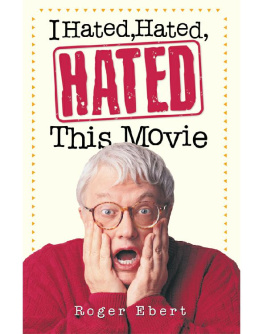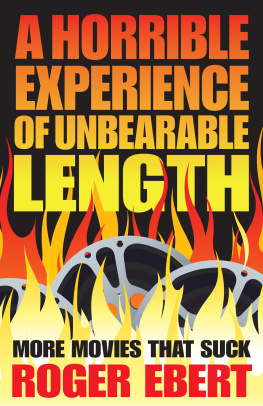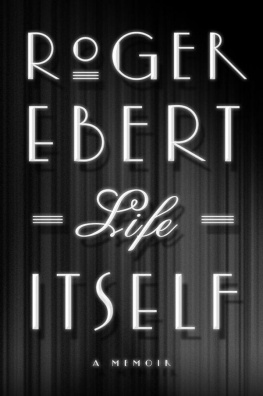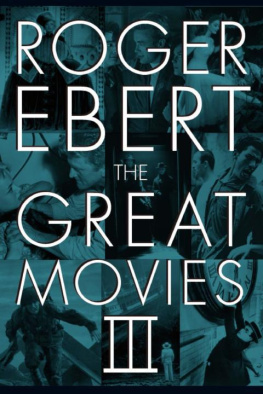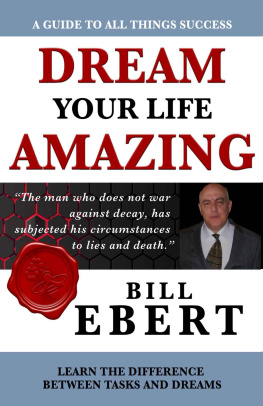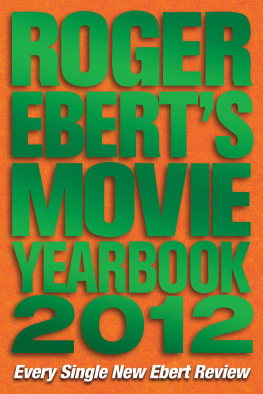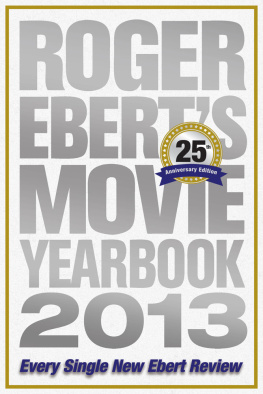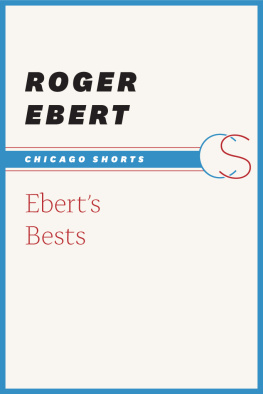Ebert - Roger Eberts Four Star Reviews: 1967-2007
Here you can read online Ebert - Roger Eberts Four Star Reviews: 1967-2007 full text of the book (entire story) in english for free. Download pdf and epub, get meaning, cover and reviews about this ebook. year: 2008;2009, publisher: Andrews McMeel Publishing LLC, genre: Art. Description of the work, (preface) as well as reviews are available. Best literature library LitArk.com created for fans of good reading and offers a wide selection of genres:
Romance novel
Science fiction
Adventure
Detective
Science
History
Home and family
Prose
Art
Politics
Computer
Non-fiction
Religion
Business
Children
Humor
Choose a favorite category and find really read worthwhile books. Enjoy immersion in the world of imagination, feel the emotions of the characters or learn something new for yourself, make an fascinating discovery.

Roger Eberts Four Star Reviews: 1967-2007: summary, description and annotation
We offer to read an annotation, description, summary or preface (depends on what the author of the book "Roger Eberts Four Star Reviews: 1967-2007" wrote himself). If you haven't found the necessary information about the book — write in the comments, we will try to find it.
Roger Eberts Four Star Reviews: 1967-2007 — read online for free the complete book (whole text) full work
Below is the text of the book, divided by pages. System saving the place of the last page read, allows you to conveniently read the book "Roger Eberts Four Star Reviews: 1967-2007" online for free, without having to search again every time where you left off. Put a bookmark, and you can go to the page where you finished reading at any time.
Font size:
Interval:
Bookmark:
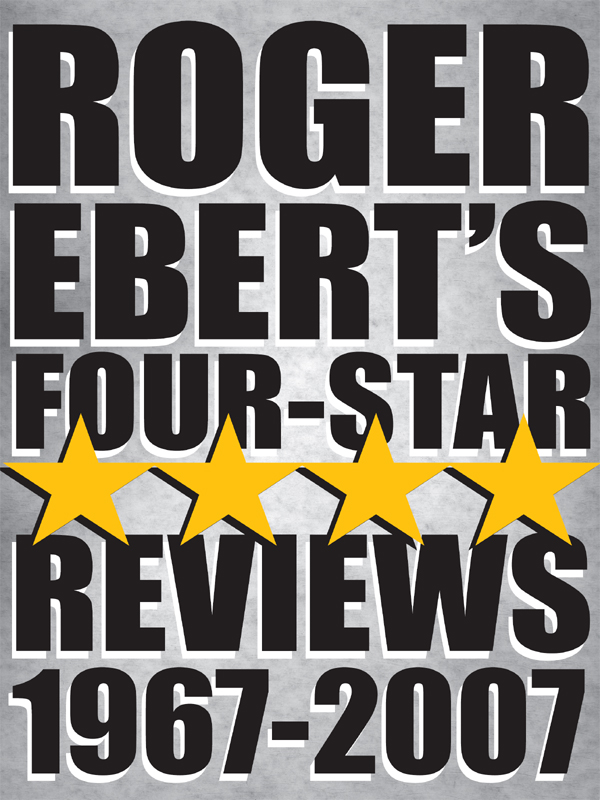

Other Books by Roger Ebert
An Illini Century A Kiss Is Still a Kiss
Two Weeks in the Midday Sun: A Cannes Notebook
Behind the Phantoms Mask
Roger Eberts Little Movie Glossary
Roger Eberts Movie Home Companion annually 19861993
Roger Eberts Video Companion annually 19941998
Roger Eberts Movie Yearbook annually 19992007
Questions for the Movie Answer Man
Roger Eberts Book of Film: An Anthology
Eberts Bigger Little Movie Glossary
I Hated, Hated, Hated This Movie
The Great Movies
The Great Movies II
Your Movie Sucks
Awake in the Dark: The Best of Roger Ebert
With Daniel Curley
The Perfect London Walk
With Gene Siskel
The Future of the Movies: Interviews with Martin Scorsese, Steven Spielberg, and George Lucas
DVD Commentary Tracks
Citizen Kane
Dark City
Casablanca
Floating Weeds
Crumb
Beyond the Valley of the Dolls
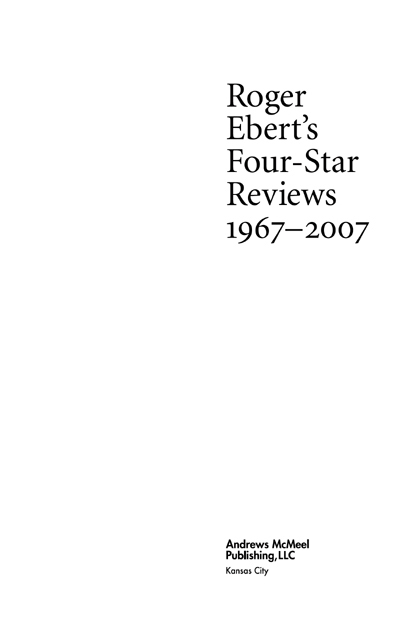
Roger Eberts Four-Star Reviews 19672007
copyright 2007 by Roger Ebert.
All rights reserved.
Printed in the United States of America.
No part of this book may be used or reproduced in any manner whatsoever except in the case of reprints in the context of reviews.
For information write Andrews McMeel Publishing, LLC, an Andrews McMeel Universal company, 1130 Walnut St., Kansas City, Missouri 64106.
E-ISBN: 978-0-7407-9217-5
Library of Congress Control Number: 2007931246
www.andrewsmcmeel.com
All the reviews in this book originally appeared in the Chicago Sun-Times.
Andrews McMeel books are available at quantity discounts with bulk purchase for educational, business, or sales promotional use. For information, please contact the Andrews McMeel Publishing Special Sales Department:
This book is dedicated to Chaz
The light at the end of the tunnel
Reading over these treasures from four decades, I am reminded of Derek Malcolms definition of a great movie: a movie you cant stand the thought of never being able to see again. Most of these pass the test. A few dont. The book collects my original reviews of these films, written at the time, and perhaps today I would see some of them differently, filtered through later films and experiences.
In a way, this is the record of a learning experience. When I wrote my first review for the Chicago Sun-Times, I had no film education and had hoped to be a professor of English literature. Yes, I went to a lot of movies, and my taste was not bad, but when the papers previous film critic retired, I think I got the job because I was young, had long hair, and had reviewed the underground films that played at Second City every Monday night.
I bought books by Pauline Kael, Andrew Sarris, Louis Giannetti, and Arthur Knight, and pondered them. In The Immediate Experience, a book by Robert Warshaw, I found and underlined this sentence: A man goes to the movies. The critic must admit that he is this man. I translated that to mean that the critic must place experience above theory, must monitor what he actually thinks and feels during the film, and trust that above all. If the film is by a great director, does that make it a great film? If it comes from a disreputable genre, does that make it unworthy? In the mind of the critic, each film must earn its own living.
I learned about the cinema on the job. It was an education to visit the sets or locations of movies being made by Henry Hathaway, Sam Peckinpah, Billy Wilder, Robert Altman, Ingmar Bergman, Federico Fellini, Luchino Visconti, Gillo Pontecorvo, Bo Widerberg, Otto Preminger, Carol Reed, Norman Jewison, Joseph Mankiewicz, and countless others. In the early days, directors and actors had time for the press; they didnt live in publicity cocoons. I remember nights in restaurants with Jewison, Martin Scorsese, Claude Chabrol, and Brian De Palma, when they engaged in self-analysis, even drawing sketches to diagram shots.
I also learned a lot by teaching. From 1969 until 2005, I taught a weekly film class in the University of Chicago Extension Division, and each class was an opportunity to screen films and prepare comments in areas I wanted to know more about. Silent films, the New Wave, documentaries, the works of Herzog, Hitchcock, Ford, Fassbinder, Truffaut, Kurosawa, Bresson, Powell, Ray. In that class I started using the shot-by-shot approach, where we would go all the way through a film with a stop-action projector, talking about composition, camera movement, lighting, and anything else. I also did that for more than thirty years at the Conference on World Affairs at the University of Colorado, and at many film festivals. It was hands-on; we saw the movie, we talked about what we saw, it was our immediate experience.
When I started on the job, I thought I would do it for perhaps five years. Now it has become a lifetime. I have become convinced in the process that the cinema is the best medium yet devised for observing, sharing, and shaping human experience. We are in the first days. What will The Godfather, La Dolce Vita, Vertigo, Raging Bull, or Rules of the Game tell those who live five hundred years from now? Will Buster Keaton still be funny? What would we give to have movies from five hundred years ago?
A key element in the love of film is the love of technique: How does the filmmaker place or move his camera, and frame his shots? How does he edit? And how is that more important than the storyline in revealing his view of the material? A review in a newspaper cannot go into the detail of a David Bordwell, but the newspaper reviewer should be alert to such questions, and not be too shy to introduce them.
As a writer, I have gained a reputation for working fast. It is not that I write particularly quickly, I think, as that I spend less time not writing. As a sixteen-year-old sports writer at the Champaign-Urbana News-Gazette, climbing the stairs at midnight after an out-of-town Friday night game, I would join Bill Lyon in the only lighted corner of the newsroom. He covered Champaign High School, I covered Urbana. He would watch me tear sheet after sheet from my typewriter, crumple it, and throw it away, searching for the perfect lead. Dont waste time on how it starts until you know how it ends, he advised me. He was two years older than I was, and smoked cigars. He was right. He went on to become a famous columnist in Philadelphia.
I came to believe that the lead paragraphs should not be the beginning of a formal top-down approach, but should read as if we had jumped into the middle of a conversation together. All my reviews began with the invisible words, So, anyway I learned not to wait for inspiration, because it would come during the writing process. I found I was taking dictation from that place within my mind that always knew what I should write next.
Another valuable piece of advice was given to me by James Hoge, the Sun-Times editor who hired me. Anyone who has the price of a newspaper should have a fair chance of understanding most of whats written in it, he told me. I tried to write clearly, to use real words and not jargon. Oddly enough, I found that longer sentences could improve clarity, and began flinging in commas, colons, semicolons, and dashes with abandon. As Sam Goldwyn might have observed, The problem with a period is that it brings a sentence to a complete halt. I think the great tragedy in recent years in the liberal arts is the replacement of coherent writing by pseudo-scientific academic jabberwocky. I believe you can discuss anything about the movies in words that are understandable. Consider the reviews of Stanley Kauffmann, clear as crystal, deep with thought and experience. Or Kael, with her slangy riffs, digging you in the ribs. Or Bordwell, discussing the most subtle intonations in an Ozu film with an undertone of, Look at this! Its really elegant how he does it.
Font size:
Interval:
Bookmark:
Similar books «Roger Eberts Four Star Reviews: 1967-2007»
Look at similar books to Roger Eberts Four Star Reviews: 1967-2007. We have selected literature similar in name and meaning in the hope of providing readers with more options to find new, interesting, not yet read works.
Discussion, reviews of the book Roger Eberts Four Star Reviews: 1967-2007 and just readers' own opinions. Leave your comments, write what you think about the work, its meaning or the main characters. Specify what exactly you liked and what you didn't like, and why you think so.

